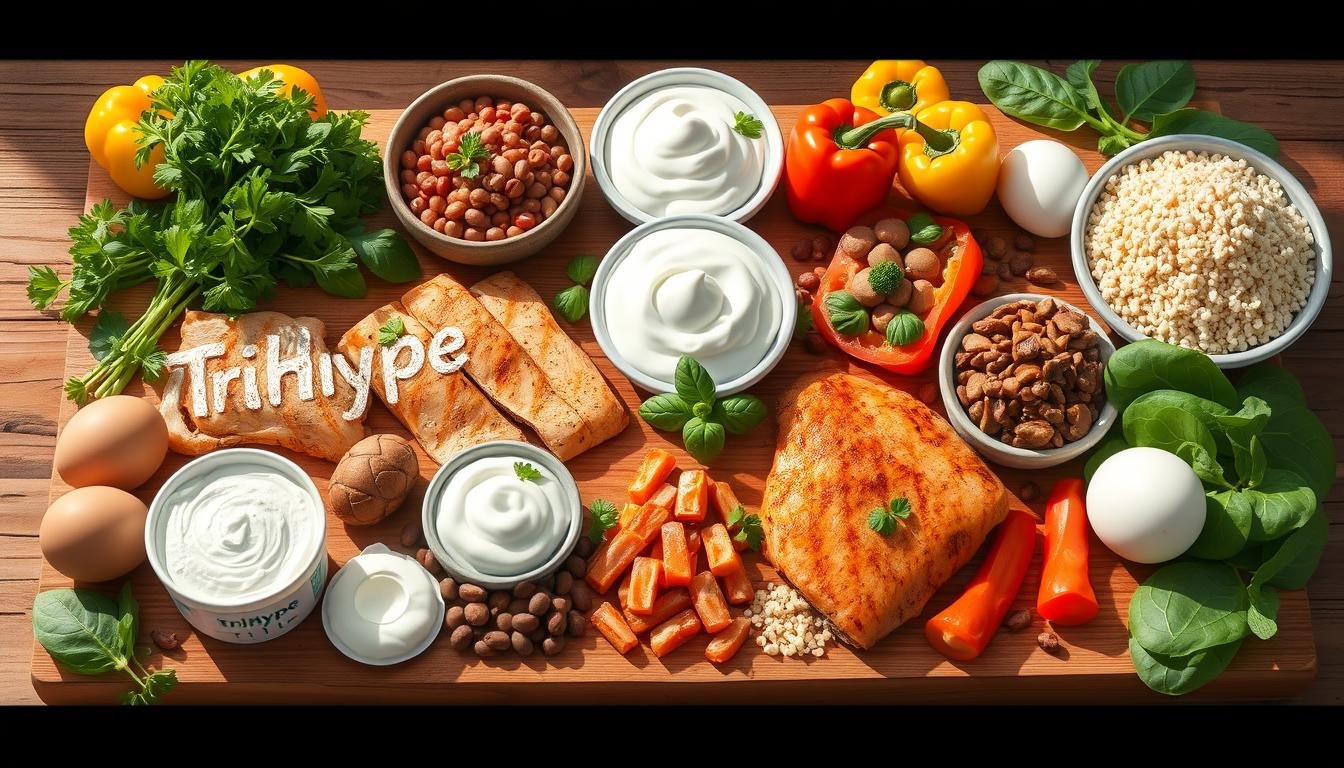Did you know eating high-protein foods can greatly improve your health? Adults who eat enough protein daily tend to lose less muscle with age. They also have lower risks of obesity and chronic diseases. This guide will cover the top 20 high-protein foods to boost your nutrition and health.
We’ll look at lean meats, plant-based options, dairy, and supplements. These foods can help you build muscle, stay energetic, or just feel better. This article will help you choose the right proteins for your diet.
Key Takeaways
- Eating high-protein foods can greatly improve your health, like reducing muscle loss and chronic diseases.
- The top 20 high-protein foods include lean meats, eggs, legumes, nuts, Greek yogurt, quinoa, fish, and plant-based protein alternatives.
- These protein-rich foods offer a variety of nutrients and can be incorporated into a balanced diet to support overall well-being.
- Gaining knowledge about the benefits and sources of high-protein foods can help you make informed choices to improve your nutrition and health.
- This article provides a comprehensive guide to the top 20 high-protein foods and their role in a balanced diet.
Unlocking the Power of Protein
Protein is key for our bodies. It helps fix and grow tissues, keeps our immune system strong, and gives us lasting energy. It’s a must-have for a healthy diet. Let’s look at why protein is important and how much we should eat each day.
Understanding Protein’s Role in a Balanced Diet
Protein does many important things in our bodies. It helps our cells grow and repair, controls hormones, and moves nutrients around. Eating enough protein can make us feel full longer, help build muscles, and keep us healthy.
Recommended Daily Protein Intake
The amount of protein we need changes based on our age, how active we are, and our health. For adults, the general rule is:
- 0.8-1.0 grams of protein per kilogram of body weight for sedentary individuals
- 1.2-1.6 grams of protein per kilogram of body weight for physically active individuals
- 1.6-2.0 grams of protein per kilogram of body weight for endurance athletes or those undergoing intense strength training
Remember, these are just general guidelines. Your protein needs might be different. Talking to a doctor or a dietitian can help figure out what’s best for you.
“Protein is the building block of our muscles, organs, and tissues, and it plays a vital role in maintaining a healthy, balanced diet.”
High Protein Foods
Adding different high-protein foods to your diet is a great way to get enough protein. You can choose from lean meats, eggs, legumes, and nuts. These foods are not only tasty but also full of nutrients.
Lean Meats
Lean meats like chicken breast, turkey, and lean beef are high in protein. They also have important vitamins and minerals. This makes them a great choice for a healthy diet.
Eggs
Eggs are known as the “perfect protein” because of their nutritional value. They are rich in protein, vitamins, and minerals. You can enjoy eggs in many ways, like scrambled, fried, or in baked goods.
Legumes
Legumes, like lentils, beans, and peas, are packed with protein. They also have lots of fiber, complex carbs, and vitamins and minerals. These foods are great for a plant-based diet.
Nuts and Seeds
Nuts and seeds, such as almonds, chia seeds, and pumpkin seeds, are good sources of plant-based protein. They are also full of healthy fats, fiber, and vitamins and minerals. These snacks are great for a quick protein boost.
| Food | Protein Content (per serving) |
|---|---|
| Chicken Breast | 30g |
| Eggs | 6g |
| Lentils | 18g |
| Almonds | 6g |
By eating a variety of these high-protein foods, you can easily meet your daily protein needs. This supports your health and well-being.
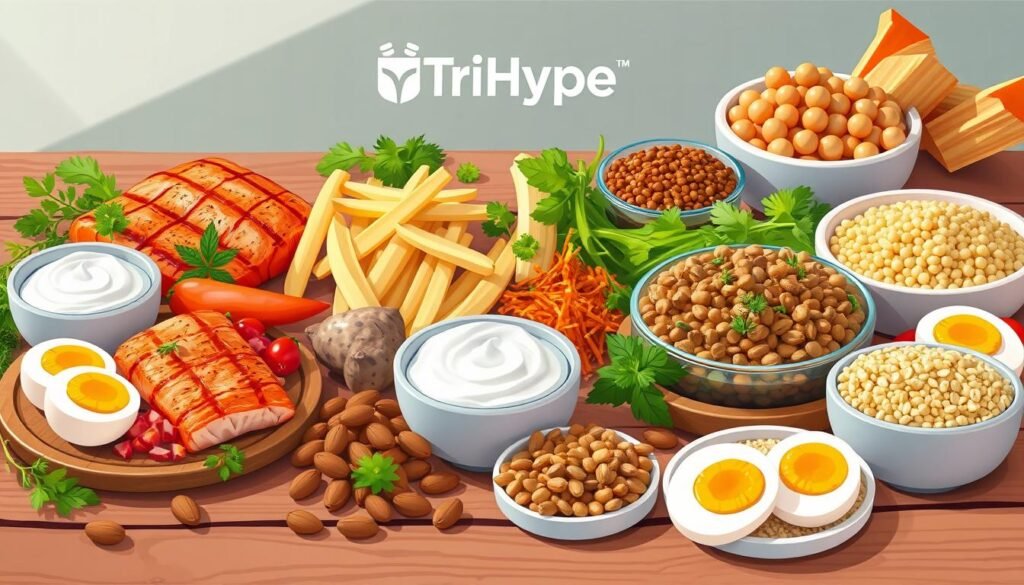
Lean Meats: A Protein Powerhouse
Lean meats like chicken breast and turkey are great for protein. They have lots of protein, but not much fat or calories. This makes them perfect for growing muscle and staying healthy.
Chicken Breast: The Versatile Protein Source
Chicken breast is a top choice for protein. It has about 30 grams of protein in every 4-ounce serving. You can use it in many dishes, like grilled meals, stir-fries, and salads. It’s also low in fat and calories, great for a healthy diet.
Turkey: A Lean and Flavorful Option
Turkey is a lean protein with lots of flavor. Like chicken breast, it has about 26 grams of protein in every 4-ounce serving. Its unique taste makes it great in sandwiches and casseroles.
Adding chicken breast and turkey to your meals boosts your protein. They help with muscle growth, keeping a healthy weight, and enjoying tasty, nutritious food.
Eggs: Nature’s Perfect Protein Package
Eggs are a top choice for high-quality protein. They have all the essential amino acids needed by our bodies. This makes them a complete and easily absorbed protein source. Plus, they’re easy to use in many dishes, making them a favorite in homes everywhere.
Each large egg gives you about 6 grams of protein. This is great for anyone wanting to eat more protein. It’s perfect for athletes, fitness lovers, or anyone who cares about their health.
| Nutrient | Amount per Large Egg |
|---|---|
| Protein | 6 grams |
| Calories | 72 calories |
| Fat | 5 grams |
| Cholesterol | 186 mg |
| Vitamins and Minerals | Vitamin A, Vitamin B12, Selenium, Riboflavin, and more |
Eggs are not just high in protein. They also have lots of vitamins and minerals. This makes them a food that’s both nutritious and versatile. They can fit well into a healthy diet.
“Eggs are one of the most versatile and nutrient-dense foods on the planet. They are an excellent source of high-quality protein and a wide array of essential vitamins and minerals.”
Scrambled, poached, or in your favorite recipes, eggs are a tasty way to get more protein. They’re good for your health and taste great too.
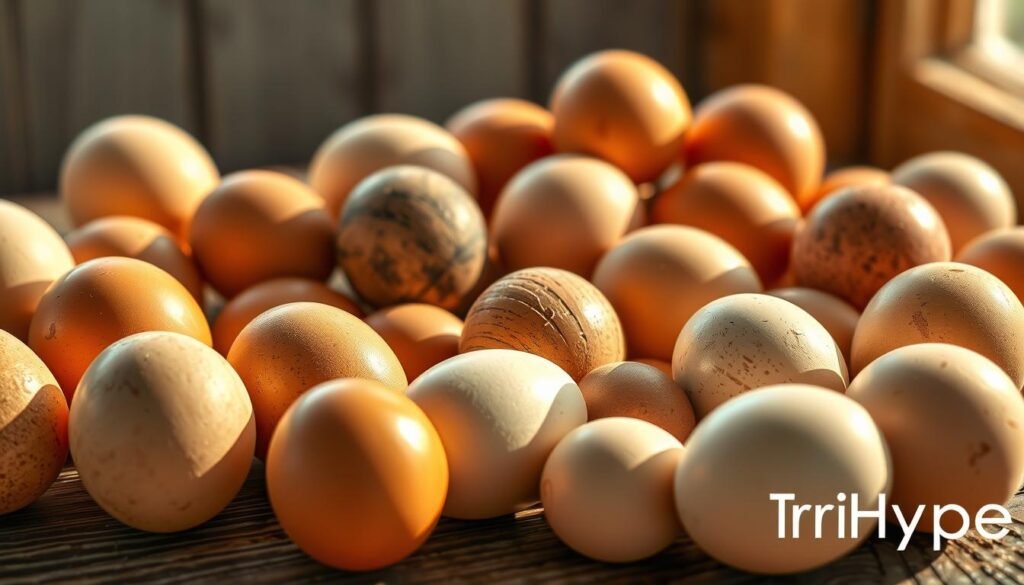
Legumes: Plant-Based Protein Superstars
Exploring high-protein foods, we find legumes as key players. These include lentils and beans, packed with nutrition and versatility. They are essential for a balanced diet.
Lentils: Packed with Protein and Fiber
Lentils are a protein powerhouse. A cup of cooked lentils has 18 grams of protein and lots of fiber. They also offer vitamins and minerals like iron, folate, and potassium.
Beans: A Nutritional Powerhouse
Beans, like black, kidney, chickpeas, and lima, are protein-rich. A cup of cooked beans has 15 to 18 grams of protein. They’re also full of fiber, complex carbs, and other nutrients.
Adding legumes to your meals is easy and tasty. It boosts your protein and brings health benefits.
Nuts and Seeds: Crunchy Protein Boosters
Nuts and seeds are a great way to add protein to your diet. They are tasty and full of protein, healthy fats, and vitamins. Almonds stand out for their high nutritional value.
Almonds: A Nutrient-Dense Snack
Almonds are a protein powerhouse. Just 23 almonds give you 6 grams of protein. They also have fiber, healthy fats, and vitamins like vitamin E and magnesium.
Adding almonds to your meals is easy. You can snack on them, add them to yogurt or oatmeal, or use them in baking. They make any meal or snack better.
| Nutrient | Amount per Serving (23 almonds) |
|---|---|
| Protein | 6 g |
| Fiber | 4 g |
| Vitamin E | 7.4 mg |
| Magnesium | 77 mg |
| Calcium | 76 mg |
“Nuts and seeds are a fantastic way to boost your protein intake and support overall health. Almonds, in particular, are a nutritional powerhouse that should be a staple in everyone’s diet.”
Next time you need a protein-rich snack, try nuts or seeds. Your body will appreciate it!
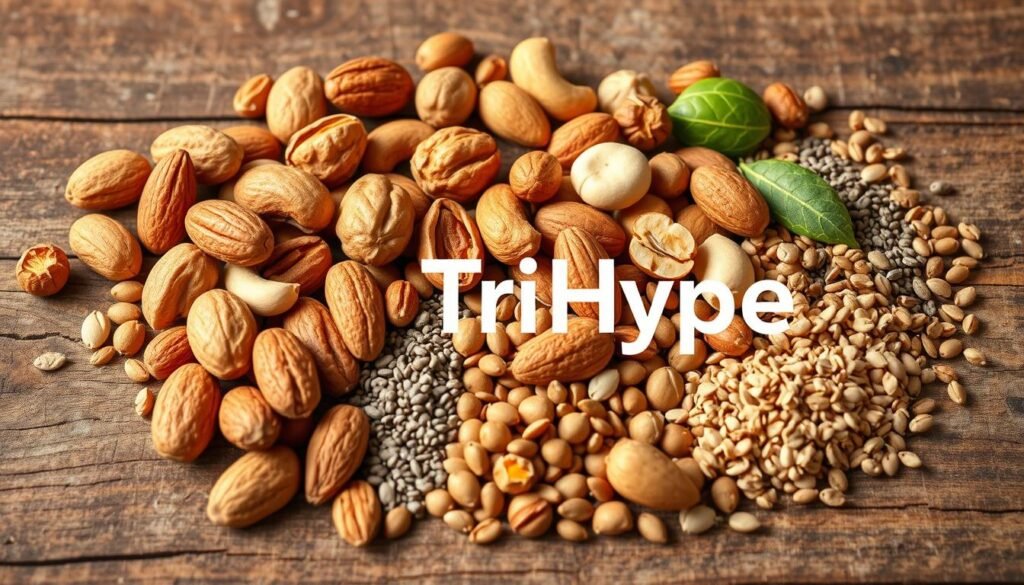
Greek Yogurt: A Creamy Protein Delight
Discover the versatility of Greek yogurt, a high-protein dairy product. It can make your meals and snacks better. Its thick, creamy texture and tangy flavor make it great for many dishes.
Versatility in the Kitchen and Beyond
Greek yogurt is full of protein and other important nutrients. It’s perfect as a base for dips, sauces, and marinades. It adds a rich, tangy flavor to your favorite recipes.
It’s also a great snack or topping. Add it to smoothies, parfaits, or even baked goods for a protein-packed boost.
One of Greek yogurt’s best features is its high protein content. It’s perfect for those who want to eat more protein. This creamy dairy product is a great addition to any balanced diet. It’s a convenient and delicious way to support your health and wellness.
| Nutrient | Amount per 1 cup (240g) of Greek Yogurt |
|---|---|
| Protein | 23g |
| Calcium | 220mg |
| Vitamin B12 | 1.3mcg |
| Riboflavin (Vitamin B2) | 0.4mg |
Adding Greek yogurt to your daily routine is a delicious and nutritious choice. It’s a great way to increase your protein intake and support your health. Whether you need a quick snack or a versatile ingredient for cooking, Greek yogurt is a true culinary delight.
Quinoa: The Protein-Packed Superfood Grain
Quinoa is a top choice among superfoods. It’s packed with protein and has all the amino acids our bodies need. This makes it a great plant-based protein source.
One cup of cooked quinoa has about 8 grams of high-quality protein. This makes it perfect for those who don’t eat meat. It helps our bodies grow strong and healthy.
- Quinoa is considered a complete protein, containing all nine essential amino acids.
- It’s a great source of fiber, vitamins, and minerals, including iron, magnesium, and phosphorus.
- The versatility of quinoa allows it to be used in a wide range of dishes, from salads and soups to pilafs and breakfast bowls.
Adding quinoa to your meals is a smart way to get more protein. It’s great for anyone who eats less meat or follows a vegan diet. Quinoa is a must-have in your kitchen.
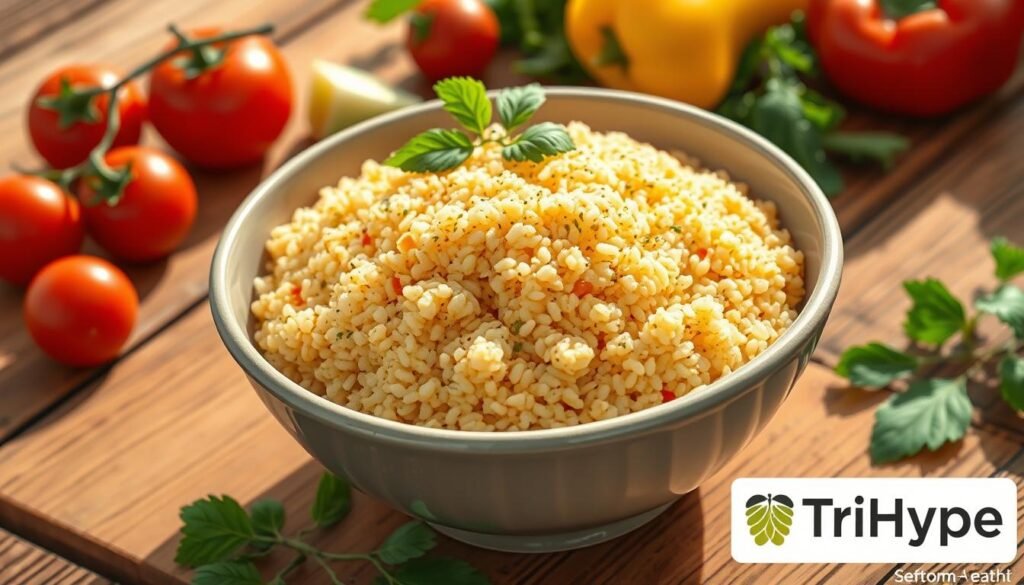
“Quinoa is a nutritional powerhouse, offering a complete protein profile and a wealth of other essential nutrients. It’s a staple ingredient in our household and a game-changer for anyone seeking to increase their protein intake.”
Fish: A Lean and Omega-Rich Protein Source
Fish, like salmon and tuna, is a top-notch protein choice. They are lean, full of nutrients, and rich in omega-3s. These fish are great for your health, offering both protein and other good stuff.
Salmon: A Nutritional Powerhouse
Salmon is a top protein pick for any diet. It’s known for its omega-3s, which are good for your heart, brain, and fighting inflammation. Salmon also has vitamins B12, D, and selenium. Eating salmon can really boost your health.
Tuna: A Convenient and Affordable Option
Tuna is another great fish choice. It’s lean, versatile, and easy on the wallet. You can have it canned or as steaks. Tuna is also full of omega-3s, vitamins B12, and selenium.
| Nutrient | Salmon (3 oz.) | Tuna (3 oz.) |
|---|---|---|
| Protein (g) | 22 | 26 |
| Omega-3s (mg) | 1,800 | 500 |
| Vitamin B12 (mcg) | 4.8 | 2.5 |
| Selenium (mcg) | 40 | 48 |
Salmon and tuna are both excellent for a lean, nutrient-rich protein source. Whether you like salmon’s rich taste or tuna’s ease, these fish are easy to add to healthy meals.
Tofu and Tempeh: Plant-Based Protein Alternatives
For those on a vegetarian or vegan diet, tofu and tempeh are great options. These soy-based foods are full of nutrients and can be made in many tasty ways. They help meet your protein needs.
Tofu is a soft, white block from soy milk. It’s a key food in Asian cooking. It’s high in plant-based protein and works well in many dishes, from stir-fries to desserts.
Tempeh is a firm, chewy soy product. It’s full of fiber, probiotics, and protein. It’s great for burgers, tacos, and more.
| Nutrient | Tofu (1/2 cup) | Tempeh (1/2 cup) |
|---|---|---|
| Protein | 10 grams | 15 grams |
| Fiber | 2 grams | 4 grams |
| Calcium | 200 mg | 88 mg |
| Iron | 1.5 mg | 2 mg |
Looking to boost your plant-based protein or mix up your meals? tofu and tempeh are both great choices. They’re nutritious and versatile.
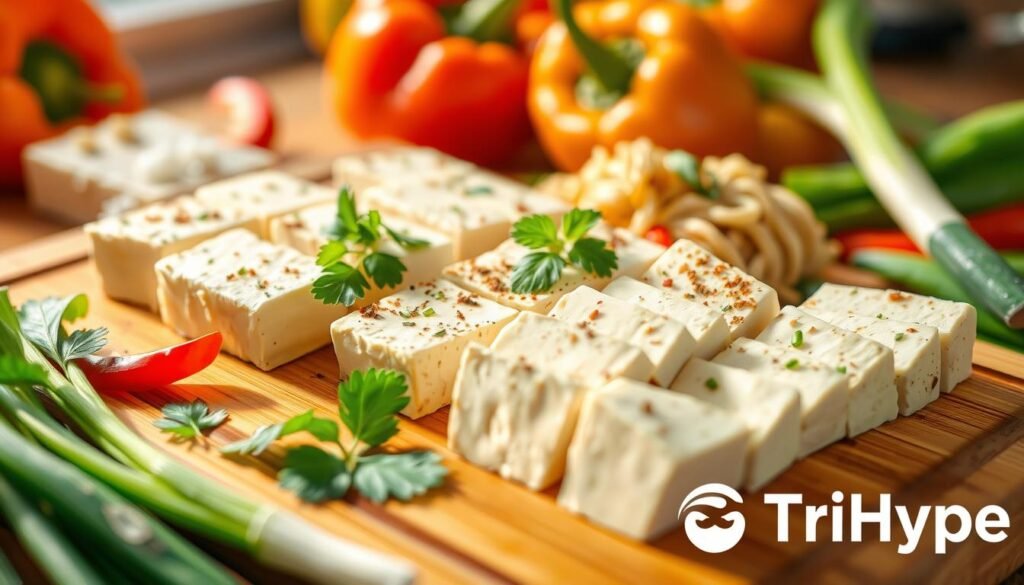
“Tofu and tempeh are incredible sources of plant-based protein that can be used in a wide variety of dishes. They’re a game-changer for vegetarians and vegans looking to meet their daily protein needs.”
Protein Powder: A Convenient Supplement
Protein powders are a great way to increase your protein intake. They are packed with high-quality protein, perfect for busy people or those who find it hard to get enough protein from food. We’ll look at the different types of protein powders and help you pick the best one for you.
Choosing the Right Protein Powder
There are many protein powders available, each with its own benefits. Unjury offers a variety of high-quality protein, including whey, casein, and plant-based options like soy, pea, and hemp. It’s important to choose a protein powder that fits your diet, fitness goals, and health needs.
When picking a protein powder, consider these factors:
- Protein Source: Different proteins have different amino acids and how fast they are absorbed. Pick one that suits your needs.
- Nutritional Profile: Look for a powder that has a good mix of protein, carbs, and healthy fats for overall health.
- Ingredient Quality: Choose a protein powder that is high-quality, minimally processed, and free from artificial additives.
- Digestibility: Some people may have sensitivities to certain proteins. Choose a powder that is easy to digest and won’t upset your stomach.
“Protein powders can be a convenient way to boost your protein intake, especially for individuals with an active lifestyle or those who have difficulty meeting their daily protein requirements through whole foods.”
By considering these factors, you can find the right protein powder for your diet and health goals. Always talk to a healthcare professional before starting any new supplement, including protein powder.
High Protein Foods for Every Lifestyle
There are many high-protein foods for everyone, no matter your diet. We’ll look at the best plant-based proteins for vegetarians and vegans. We’ll also cover the top choices for weightlifters, athletes, and those who are always on the move.
Vegetarian and Vegan Protein Sources
Vegetarians and vegans have lots of protein options. Some top picks include:
- Legumes (lentils, beans, peas)
- Tofu and tempeh
- Quinoa
- Nuts and seeds
- Nutritional yeast
- Seitan
These plant-based proteins are full of amino acids. They also have other important nutrients. This makes them great for a balanced diet.
Protein for Weightlifters and Athletes
For those who are always active, eating enough protein is key. It helps with muscle recovery and growth. Here are some top protein foods for athletes:
- Lean meats (chicken, turkey, lean beef)
- Fish (salmon, tuna)
- Eggs
- Greek yogurt
- Protein powders (whey, casein, plant-based)
These foods give you the amino acids you need. They also have healthy fats, vitamins, and minerals. These are important for an active lifestyle.
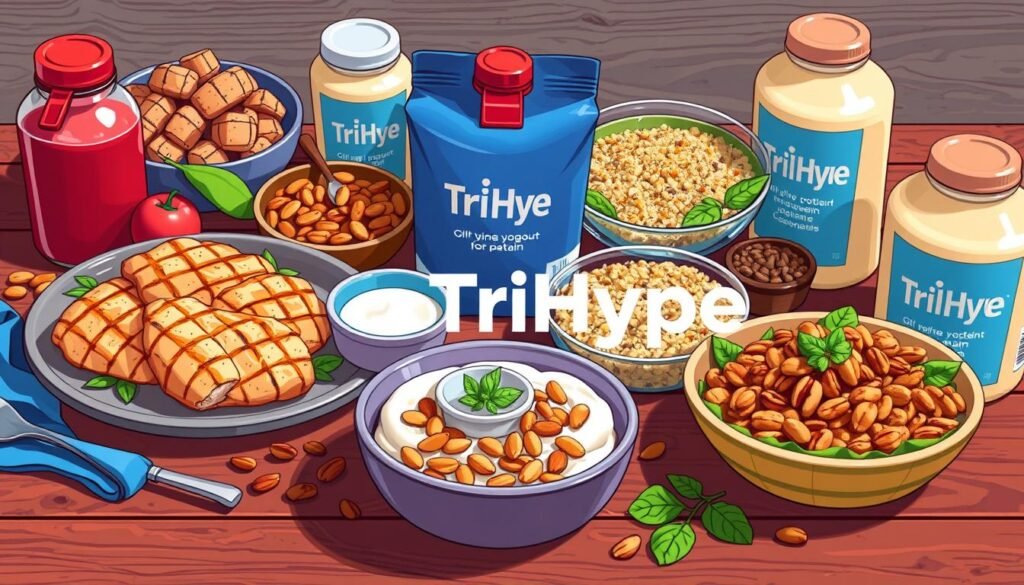
“Proper nutrition, including adequate protein intake, is essential for athletes to perform at their best and support muscle recovery and growth.”
Adding a variety of high-protein foods to your diet is important. It helps you meet your dietary needs, whether you’re vegetarian, vegan, or always on the go.
Incorporating More Protein into Your Diet
Adding more protein-rich foods to your diet is easy and beneficial. It helps build muscle, keeps you full, and boosts your health. We’ll share tips for meal planning and prep to make high-protein foods a part of your daily life.
Meal Planning and Preparation Tips
Planning meals ahead can change the game for more protein in your diet. Here are some tips to start:
- Plan your meals for the week with a mix of protein-rich foods like lean meats, eggs, legumes, and dairy.
- Prepare protein-packed dishes like grilled chicken, roasted salmon, or lentil stew in bulk. Portion them out for easy meals all week.
- Stock your pantry and fridge with protein-rich staples like canned beans, nuts, and Greek yogurt to make meal prep easier.
- Try new recipes with high-protein foods, like quinoa bowls or tofu stir-fries, to mix up your meals.
- Add protein-rich snacks like hard-boiled eggs or protein bars to your daily routine to increase your protein intake.
By planning and preparing your meals, you can ensure you get enough protein. This, along with a balanced diet, will help you reach your health and fitness goals.
“Proper meal planning and preparation is the key to consistently incorporating more protein into your diet. With a little organization and creativity, you can make high-protein meals and snacks a regular part of your lifestyle.”
Adult nutrition: Balanced meals throughout the week
Conclusion
In this guide, we’ve looked at the top 20 high protein foods. These can boost your nutrition and support your health. We’ve covered lean meats, plant-based options, dairy products, and supplements.
Choosing the right high protein foods can lead to a healthier lifestyle. Whether you want to build muscle, manage your weight, or eat nutritious, these foods have you covered. They offer many options to fit your needs and likes.
Keep working towards better health and wellness. Make sure to eat a variety of foods, not just high protein ones. With this guide, you’re ready to explore the benefits of protein and reach your dietary goals.
